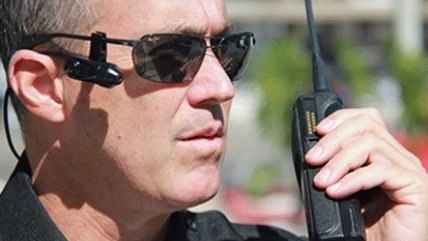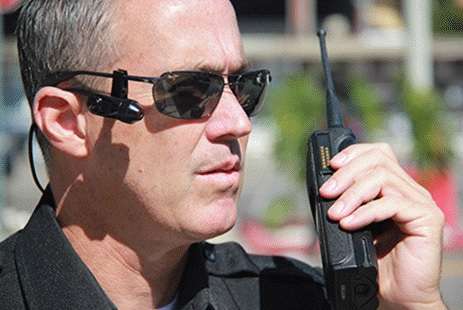DOJ Announces Funds for Police Body Cameras, but Keep an Eye on the Rules Cities Implement
New rules in Los Angeles give officers opportunity to review evidence in advance.


New Attorney General Loretta Lynch today announced the Department of Justice (DOJ) will be offering $20 million in body camera equipment and training to police departments across the country. This was not an unexpected development. The Obama administration was pushing for body cameras as a way of improving policing in the wake of Michael Brown's shooting in Ferguson, Missouri. From the DOJ:
"Body-worn camera technology is a valuable tool for improving police-citizen relationships," said Director Denise O'Donnell of the Bureau of Justice Assistance. "BJA is committed to helping law enforcement agencies identify the safest and most effective methods for deploying this technology and addressing factors such as privacy, archiving and legal regulations surrounding its use. BJA stands by to guide agencies through what can be a complex process toward more successful adoption of the technology."
The Justice Department expects to provide 50 awards to law enforcement agencies, with about one-third of the grants directed toward smaller law enforcement agencies. The grants, which require a 50/50 in-kind or cash match, can be used to purchase equipment but applicants must establish a strong plan for implementation of body-worn cameras and a robust training policy before purchasing cameras. The long term costs associated with storing this information will be the financial responsibility of each local agency.
Keep an eye on those implementation plans, though. In the aftermath of Freddie Gray's death while in the custody of the Baltimore Police, Reason has noted how police officers have special rights when they're faced with accusations of potentially criminal misconduct. In Baltimore, a police officer can wait for 10 days before having to answer questions from investigators, thanks to union rules.
We're seeing similar potential problems with how law enforcement agencies may implement rules in how body camera footage will be used in investigations. Former Reason Editor Matthew Feeney, now at the Cato Institute, took note of part of the new policy proposed for the use of body cameras by the Los Angeles Police Department earlier this week. The LAPD's body camera policies would allow officers in use of force incidents to review his or her own camera footage before being interviewed by investigators:
This proposal would provide officers with an opportunity that is not afforded to citizens accused of crimes: to view evidence against them prior to being interviewed by investigators. Police officers involved in a use-of-force incident should not be allowed to view their own body camera footage or the footage captured by colleagues' body cameras before speaking to investigators. An officer involved in a use-of-force incident should give comments to investigators that have not been influenced by police body camera footage.
Allowing officers to view body camera footage before speaking to investigators not only means that their statements will not necessarily be an accurate reflection of what they thought during the incident, it also allows officers the opportunity to look for evidence that may exonerate them before a statement is made.
Nevertheless, the new rules were passed by the Los Angeles Police Commission Tuesday, though not without some debate. From the Los Angeles Times:
The American Civil Liberties Union of Southern California opposed letting officers see the videos first, arguing that the practice would give them an opportunity to shape their accounts around what the recording showed. Giving officers — but not the public — a chance to look at the footage also undermined the accountability that the cameras are intended to bring, the organization said.
Commissioner Robert Saltzman agreed, saying the department needed to be mindful of a widespread public perception that officers aren't always truthful.
But LAPD Chief Charlie Beck said allowing officers to first look at the footage would help them "get to the truth of what occurs," a key objective of using the body cameras. Beck said he doesn't intend to make the footage public in the vast majority of cases, citing privacy issues and the fact that they could be used as evidence in criminal or civil cases.
The ACLU subsequently dropped support for the program.
Editor's Note: As of February 29, 2024, commenting privileges on reason.com posts are limited to Reason Plus subscribers. Past commenters are grandfathered in for a temporary period. Subscribe here to preserve your ability to comment. Your Reason Plus subscription also gives you an ad-free version of reason.com, along with full access to the digital edition and archives of Reason magazine. We request that comments be civil and on-topic. We do not moderate or assume any responsibility for comments, which are owned by the readers who post them. Comments do not represent the views of reason.com or Reason Foundation. We reserve the right to delete any comment and ban commenters for any reason at any time. Comments may only be edited within 5 minutes of posting. Report abuses.
Please to post comments


"And if, after you've expended the funds needed on body cameras, there is any left over, go ahead and get your MRAP's a new paint job."
Go for a nice crimson red. The stains won't stand out.
Money left over? Maybe you missed the part where it was; 'DOJ will match dollar for dollar up to 50%'.
Every camera will have less than 700 lines of resolution of 256 grayscale video.
Maybe you missed where my comment was a subtle jab at the fact that the federal government's militarization of police was a huge part of the problem. And where I just skimmed the article.
I make up to $90 an hour working from my home. My story is that I quit working at Walmart to work online and with a little effort I easily bring in around $40h to $86h? Someone was good to me by sharing this link with me, so now i am hoping i could help someone else out there by sharing this link... Try it, you won't regret it!......
http://www.work-cash.com
"Well we couldn't afford batteries on the budget they gave us. We're hoping to get those when we receive our next Block Grant...."
Winner.
Giving the police camera to record themselves isn't going to make the police actually police themselves. It ALWAYS has to come from without.
It seems like police would welcome video, especially if they could get live feeds a la tactical response and situational awareness.
Which leads me to wonder;
If the police show up at my house and want to search it, they have to get a warrant. If the officers videochat and agree to be observed by the judge (IA, or whatever), via wireless bodycam, as a search is performed, under some manner of provisional warrant are we still within the confines of the law as it stands?
Seems like as many ways to use cameras against civilians as in favor of them and that, without policy/procedural/structural reform, you're right. I have zero faith in the DOJ looking out for the rights of civilians in all of this.
It seems like police would welcome video, especially if they could get live feeds a la tactical response and situational awareness.
There are many times the police would not want that recorded...
There are many times the police would not want that recorded...
Right, but it's a tool. You can use/sell it for good or bad. I'm sure somebody with skills better than mine could cook up an FOP telemarketing spiel about getting valuable information about injuries and conditions to EMPs before they arrive on the scene of an accident or shooting... or getting up-to-the-minute *video* footage of escaped criminals to every officer in the vicinity.
Just wondering about how easily the tool would/could be used against me. I mean, for better or for worse, it's only a matter of time before an officer figures out that he can have a judge issue warrants and his union rep toss him legal foils in real time.
or getting up-to-the-minute *video* footage of escaped criminals fleeing suspects to every officer in the vicinity.
Edit dammit.